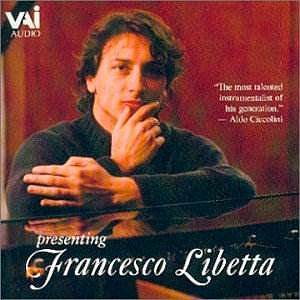PRESENTING FRANCESCO
LIBETTA
Ottorino RESPIGHI
Ancient Airs and Dances: Gagliarda;
Siciliana
Carlo GESUALDO
Canzon francese
Leopold GODOWSKY
Studies on the Chopin Etudes: op.10/3; Badinage (op.10/5 and op.25/9
simultaneously)
Maurice RAVEL
La Valse (transcribed by composer)
Claude DEBUSSY
Estampes
Franz LISZT
O du mein holder Abendstern (from Wagner's
Tannhäuser)
Valse (from Gounod's
Faust)
Frédéric CHOPIN
Mazurka in a, op.68/2
Camille
SAINT-SAENS
Etude en form de valse, op.52/6
Federico MOMPOU
Canción VI
 Francesco Libetta
(pianoforte). Live recital, Lincoln Theater, Miami Beach, Florida, 27
Feb 2000.
Francesco Libetta
(pianoforte). Live recital, Lincoln Theater, Miami Beach, Florida, 27
Feb 2000.
 VAI AUDIO VAIA 1196
[72.30]
VAI AUDIO VAIA 1196
[72.30]
UK distributor Kindom Records, Clarendon House, Shenley Road, Borehamwood,
Herts WD6 1AG Tel +44(0)20 8207 7006 fax +44(0)20 8207 5460

Does it really help if a disc arrives with its built-in hype? We learn from
the cover that Aldo Ciccolini has hailed Francesco Libetta as "the most talented
instrumentalist of his generation". Opening the booklet we read more. He
is "the reincarnation of Dinu Lipatti" (Eric Schoones) and "of the new generation
of pianists, Francesco Libetta is the most inspired and creative" (John Ardoin).
Is there not some risk that the producers of the disc will appear to have
cold feet, to be not entirely confident that an unprepared listener will
perceive Libetta's heralded stature merely by hearing him?
Libetta's particular claim to uniqueness, we are told, lies in the fact that
is only the second pianist to have played Godowsky's 53 studies on
Chopin complete in concert, and the first to have done it from memory. If
this conjures up pictures of generations of famous pianists shaking their
seized-up wrists in despair as their life-long ambition recedes ever further
into the horizon, the truth is that plenty of pianists who could have carried
off the feat - Richter or Brendel in their earlier years, for example - are
unlikely to have wished to do so. And even pianists who have made a speciality
of this sort of romantic bric-à-brac - Bolet, Cherkassky or Wild -
have found a few of them to be enough.
None of these considerations disprove the claims made on Libetta's behalf,
but what will the open-minded listener find in this, his American début?
The Respighi pieces are clean in texture, avoiding heaviness in some
potentially very clumpy left-hand chordal writing, the contrapuntal lines
well drawn. The Gesualdo works better than one might have feared but
I hope it will not provoke a spate of such attempts. I'm all for Bach
on the piano but here is music calculated for the colours of the Renaissance
organ and the halo of an ecclesiastical acoustic around it.
So now we come to the two Godowsky/Chopin pieces. The first is presented
in a laid-back, slightly drifting style closer to Rachmaninov than Chopin,
but this is reasonable enough since the point of the piece, with its almost
bluesey added harmonies, is presumably that you don't try to play it in the
style of the original. What I do find is that the melody, while pleasantly-enough
unfolded, lacks the particular inflections we hear in the greatest performances
of the original study. My concern with "Badinage" is that what we get is
very much op.25/9 with an accompaniment. In other words, the op.10/5 study
is only really evident during pauses in the other one, while the idea is
presumably that the two should be pitted against each other. Whether this
can be done I don't know, and the miscalculation may be Godowsky's rather
than Libetta's. What we do appreciate is that Libetta shows much natural
musicianship, unruffled by the extreme difficulties of what he is playing.
This is evident again in La Valse, where much natural rubato, reminiscent
of a favourite orchestral recording under Cluytens, is not allowed to impede
the overall build-up towards the orgiastic conclusion. This latter brings
a fairly brutal attack upon the piano, but the fault may be as much
Ravel's as Libetta's. Many Ravel specialists, Gieseking for example,
have preferred not to consider this transcription as part of the Ravel pianistic
canon.
Estampes are warmly coloured and nicely paced, with a notably steady
Jardins sous la pluie. But mention of Gieseking only serves to point
out the difference between performances which take off and ones which merely
drift pleasantly along. Again, the root of it seems to lie in a lack of
inflections to the melodic lines which make them really speak, or which make
them rise out of the written page instead of sitting agreeably on it. This
shortcoming also affects the admittedly pleasant Liszt "Star of Eve"
transcription, whose only justification can be an operatically sung melodic
line. The Faust transcription (and also the Saint-Saëns encore)
has a woeful lack of Gallic grace and some uneven passage-work which I might
have chivalrously passed over had this artist's trump card not supposedly
been his phenomenal technique. Add a Chopin Mazurka which, one or
two overdone rhythmic hesitations apart, is penny-plain and a
sympathetically-read Mompou Canción and the picture
is completed of a pianist who, for all the hype, impresses for his sincere,
unruffled musicality without quite obtaining the speaking quality of the
greatest pianists.
So how about forgetting the pyrotechnics and letting us have a disc of Schubert
Impromptus and Moments Musicaux, to let us hear just what sort of
a musician Libetta is?
Christopher Howell


